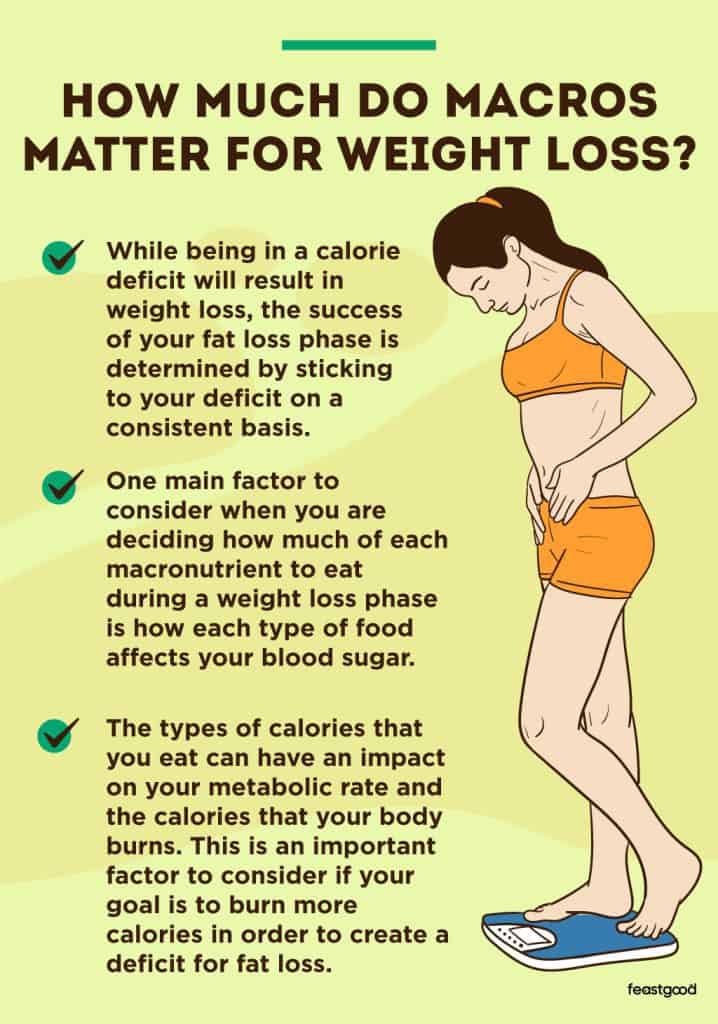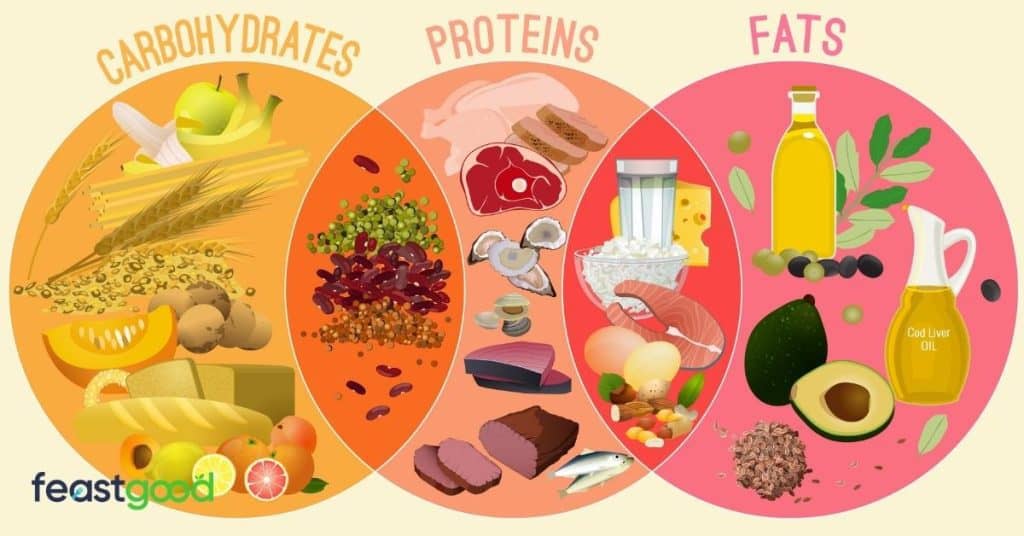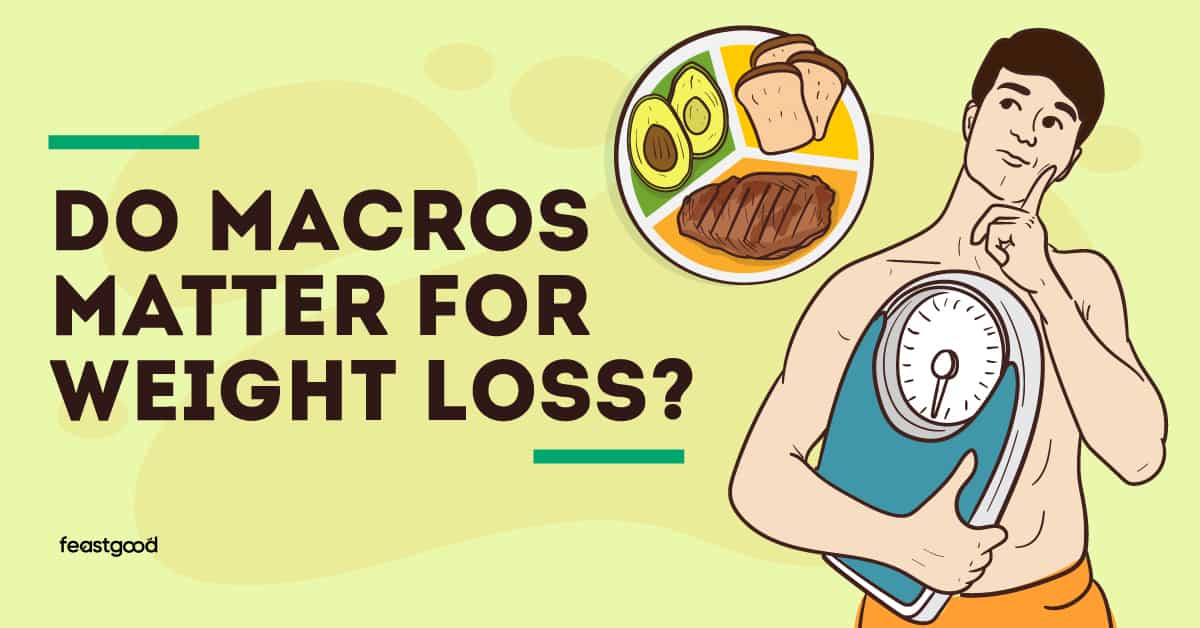When you are looking to lose weight, the most important factor is creating a calorie deficit, which can be done through increasing movement and decreasing calorie intake. Once you have created a calorie deficit, the next question becomes whether the composition of your food (the macros) will affect your weight loss.
Do macros matter for weight loss? Yes, macros matter for weight loss. While the most important influence for weight loss is being in a calorie deficit, the types of foods that you eat, and your macro split, can affect factors such as how well you can stick to your diet, your blood sugar levels, and how much energy you use to metabolize your food.
Since the most important thing when aiming for weight loss is to be in a calorie deficit, it may seem like you could get those calories from any food source and still have success. However, it is highly advised that while in a fat loss phase, you fill your calories with a balanced amount of whole foods.
If you choose to fill your calories with mostly processed foods high in simple carbohydrates or unhealthy fat, it could have an overall negative effect on your long-term health and will do nothing to optimize your weight loss.
In this article, you will learn:
- Energy balance: How this impacts weight loss results
- How much do macros matter for weight loss?
- What is the best macro split for weight loss?
- If trying to lose weight, do macros besides protein matter?
- Do you need to track macros if you want to lose weight?
Check out our complete guide on How To Track Your Macros.
Energy Balance: How This Impacts Weight Loss Results
If you are looking to lose weight, paying attention to your energy balance is the most important thing that you need to do in order to see progress.
Simply put:
Your energy balance is the calories that you are taking in versus the calories that you expend or burn. If you want to lose weight, you must ensure that you are regularly burning more calories than you are consuming. If you do not do this, it does not matter what else you do, you will not see weight loss.
In order to make sure that you are creating a calorie deficit, you must have a good understanding of how many calories you are currently expending in a day.
The most accurate way to do this is to determine your Total Daily Energy Expenditure, or your TDEE.
The equation for your TDEE is:
BMR (Basal Metabolic Rate) +TEF (Thermic Effect of Food) +EAT (Exercise Activity Thermogenesis) +NEAT (Non-Exercise Activity Thermogenesis) =TDEE
You can also use an online calculator to determine your TDEE, like this one here. And, If you are curious to know your BMR, use our BMR calculator.
Once you have determined how many calories that you burn in a day, you will be able to regulate how many calories that you need to be eating in order to be in a deficit to achieve weight loss.
For example, if you look at an active 25-year-old male who is 5’10” tall and 200 pounds, his TDEE would be about 2781 calories per day. For him to be in a large enough deficit for weight loss, he would need to be consuming anywhere from 2281 to 2531 calories per day.
For example, if you look at an active 25-year-old male who is 5’10” tall and 200 pounds, his TDEE would be about 2781 calories per day. For him to be in a large enough deficit for weight loss, he would need to be consuming anywhere from 2281 to 2531 calories per day.
I will elaborate on how the types of calories that you eat during your deficit can have an impact on your weight loss in the section below.
Related Articles:
How Much Do Macros Matter for Weight Loss?

The types of macronutrients that you eat in your diet will not outweigh the importance of being in a calorie deficit if you are looking to lose weight.
This was demonstrated in one particular study, where 645 overweight individuals were assigned calorie deficit diets of different macro proportions, and all achieved similar weight loss success over a 2-year period.
Despite this fact, it is important not to underestimate the importance of eating a well-balanced diet, and the effect that this can have on not only the success of your weight loss, but the overall health of your body.
Your macro split can affect your weight loss phase in multiple different ways, such as:
- How adherent you are to your calorie deficit and your hunger levels
- Whether or not blood sugar levels are optimal for weight loss
- Metabolic rate and how much energy the body uses to metabolize food
1. How Adherent You Are to Your Calorie Deficit and Your Hunger Levels
While being in a calorie deficit will result in weight loss, the success of your fat loss phase is determined by sticking to your deficit on a consistent basis. There are many factors that can influence how adherent you are to your diet, with your food choices being high on the list.
The types of food that you eat can have a large effect on your hunger and fullness levels, and if you are not choosing foods that promote fullness and satiation, you are going to have a very hard time sticking to your diet.
Foods that promote fullness and satiety are typically whole, nutrient dense foods that are filled with vitamins, minerals, water and fiber. A few good examples of these types of foods include:
- Fruits
- Vegetables
- Whole grains
- Nuts and seeds
In contrast, there are foods that will not provide the same feeling of fullness and satisfaction in the same way that whole foods can.
For example, foods that are high in simple carbohydrates accompanied by little to know nutrients or fiber will leave you feeling unsatisfied and hungry shortly after eating.
A few examples of foods that will not provide you with a feeling of fullness are:
- Sugary drinks like sugar loaded coffee drinks or sodas
- Cookies, cakes, muffins, cereals, and other refined sweet food products
- Potato chips, pretzels, and white bread
In order to make sure that you are feeling full throughout your weight loss phase, be sure to stick to whole foods that are high in fiber. This small step will help you to increase the adherence to your diet which will contribute to your success.
Related Articles:
- 400 Calorie Deficit: Is It Healthy & How Much Can You Lose?
- 1000 Calorie Deficit: Is It Healthy & How Much Can You Lose?
2. Whether or Not Blood Sugar Levels Are Optimal for Weight Loss
One main factor to consider when you are deciding how much of each macronutrient to eat during a weight loss phase is how each type of food affects your blood sugar.
In order to maintain optimal health and balanced blood sugar, you must make sure that you are not eating too many carbohydrates, in particular simple carbohydrates.
When you eat an abundance of simple carbohydrates, especially coming from refined food sources, this can cause a spike in your blood sugar. This spike in blood sugar can potentially cause insulin resistance, which can cause fat storage particularly in the stomach area.
Frequently having high blood sugar and developing insulin resistance can have other negative effects on your body, such as high blood pressure, high cholesterol. If this gets severe enough, it has the potential to turn into Type 2 diabetes.
In order to ensure that you do not overdo your refined carbohydrate consumption that can result in the issues above, make sure that you are consuming a variety of carbohydrates rich in nutrients and fiber, and balance out your carb intake with protein and fat.
- Related Article: Should You Weigh Food Raw or Cooked When Tracking Macros?
3. Metabolic Rate and How Much Energy the Body Uses to Metabolize Food
The types of calories that you eat can have an impact on your metabolic rate and the calories that your body burns. This is an important factor to consider if your goal is to burn more calories in order to create a deficit for fat loss.
For example, each macronutrient takes different amounts of energy for the body to metabolize (this is called your Thermic Effect of Food, or TEF), which will influence your TDEE. The macronutrient that takes the most energy to break down is protein, followed by carbohydrates, with fat taking the least amount of energy to break down.
This is typically why high protein diets are encouraged during a fat loss phase, as the extra calorie burn that you can get from consuming protein in comparison to fats can help you to create more of a deficit.
Similarly, this is why increasing your fat and carbohydrate is encouraged if your goal is to maintain or gain weight. Eating more calories from fats will reduce the percentage of calories that you burn through the Thermic Effect of Food, and reduce your overall TDEE.
- Related Article: Is It Better To Hit Your Macros or Calories?
What Is the Best Macro Split for Weight Loss?

As it was mentioned in the section above, weight loss can be possible no matter what macro split that you choose. Despite this, there are certain macronutrient ratios that are going to be more optimal for a weight loss phase in comparison to others.
The most suggested macro split for a healthy balance of all 3 macronutrients is around 50% carbs, 30% protein and 20% fats. However, if your goal is specifically fat loss, adjusting this ratio may help you succeed.
Because protein has the highest thermal effect in the body, if you want to burn more calories it is recommended to increase your intake of protein. In addition to this, keeping fat a bit lower during a fat loss phase (especially if you are still consuming a fair amount of carbs) will be in your best interest.
- Related Article: 33-33-33 Macros: What Is It, How It Works, & Sample Meals
If Trying to Lose Weight, Do Macros Besides Protein Matter?
In order to have success with losing weight, it is most beneficial if you have a proper balance of all 3 macronutrients.
While protein is touted as the most important macronutrient to eat during a weight loss phase, it does not mean that carbs and fat do not have their place in fat loss.
If you only consume protein, you will deprive your body of many essential nutrients that come from foods rich in healthy carbs and fat.
For example, if you don’t consume enough healthy carbohydrates high in fiber while trying to lose weight, you may struggle with maintaining good energy throughout your day.
Whole food carbohydrates that are full of vitamins, minerals, water and fiber are also essential for other bodily functions such as digestive health.
If you were to only consume protein, which is very low in fiber, you would most likely experience digestive issues such as constipation from lack of dietary fiber.
Eating healthy fats during your weight loss phase is also important, as fats help you to feel satisfied and full for longer after your meal. Fats are also a crucial nutrient for the overall health of your body.
For example, there are certain essential fatty acids, such as linoleic and linoleic acid, that we must get from our food, as our body doesn’t make them. If you choose to neglect fats in lue of more protein, this will be a difficult diet to sustain, and you could be putting your health at risk.
Essential fatty acids are crucial for bodily functions such as brain development, controlling inflammation in the body, and blood clotting. Fats are also essential for skin, hair and nail health, along with the absorption of fat soluble vitamins A, D, E and K.
While the examples above may not affect weight loss directly, if the body is not in good health, it will be more difficult to lose weight long term. Therefore, it is best if you have a good balance of all 3 macronutrients.
- You’ve just learned about whether macros matter for weight loss, now learn whether macros matter for bulking.
Do You Need to Track Your Macros If You Want to Lose Weight?

If your goal is to lose weight, you do not necessarily need to count your macros in order to reach your goal. The number one thing that will determine the success of your fat loss phase is if you are in a consistent calorie deficit. While the types of calories can influence your weight loss, they will not make or break your success.
If you are seeking guidance on how to track your calories for weight loss or to learn the best macronutrient split for you, it can be really helpful to speak to a coach who can help customize a nutrition plan for you. To book a 20 minute free consult call with one of our coaches to discuss your personal health and fitness goals, click the link here.
What To Read Next
Now that you know macros matter for weight loss, the next few things you should learn about are:
- How To Track Alcohol Macros: The Do’s And Don’ts
- How To Count Calories Without Getting Obsessed (5 Tips)
- I Burned More Calories Than I Ate & Still Gained Weight (Why)
- Is It Normal to Lose 3 Pounds Overnight (9 Explanations)
- How To Increase Protein Intake Without Increasing Your Fat
- Going Over Your Calories Once A Week: Is This Okay?
- Can You Lose Fat Eating Maintenance Calories?
- Can You Undereat And Not Lose Weight?
- Mini Cut: What Is It + How To Do It Properly
- How Can “Apple Shape” Bodies Lose Weight (Step By Step Guide)
References
Sacks, F. M., Bray, G. A., Carey, V. J., Smith, S. R., Ryan, D. H., Anton, S. D., McManus, K., Champagne, C. M., Bishop, L. M., Laranjo, N., Leboff, M. S., Rood, J. C., de Jonge, L., Greenway, F. L., Loria, C. M., Obarzanek, E., & Williamson, D. A. (2009). Comparison of weight-loss diets with different compositions of fat, protein, and carbohydrates. The New England journal of medicine, 360(9), 859–873. https://doi.org/10.1056/NEJMoa0804748
Samra RA. Fats and Satiety. In: Montmayeur JP, le Coutre J, editors. Fat Detection: Taste, Texture, and Post Ingestive Effects. Boca Raton (FL): CRC Press/Taylor & Francis; 2010. Chapter 15. Available from: https://www.ncbi.nlm.nih.gov/books/NBK53550/
Amen DG, Harris WS, Kidd PM, Meysami S, Raji CA. Quantitative Erythrocyte Omega-3 EPA Plus DHA Levels are Related to Higher Regional Cerebral Blood Flow on Brain SPECT. J Alzheimers Dis. 2017;58(4):1189-1199. doi: 10.3233/JAD-170281. PMID: 28527220.
De Mel D, Suphioglu C. Fishy business: effect of omega-3 fatty acids on zinc transporters and free zinc availability in human neuronal cells. Nutrients. 2014 Aug 15;6(8):3245-58. doi: 10.3390/nu6083245. PMID: 25195602; PMCID: PMC4145306.
About The Author

Colby Roy is a holistic health and nutrition coach. She is certified through Precision Nutrition and has a passion for all things nutrition and healing the body. More specifically, Colby likes to work with clients who want to optimize their gut health and energy levels.
Why Trust Our Content

On Staff at FeastGood.com, we have Registered Dietitians, coaches with PhDs in Human Nutrition, and internationally ranked athletes who contribute to our editorial process. This includes research, writing, editing, fact-checking, and product testing/reviews. At a bare minimum, all authors must be certified nutrition coaches by either the National Academy of Sports Medicine, International Sport Sciences Association, or Precision Nutrition. Learn more about our team here.
Have a Question?
If you have any questions or feedback about what you’ve read, you can reach out to us at [email protected]. We respond to every email within 1 business day.

